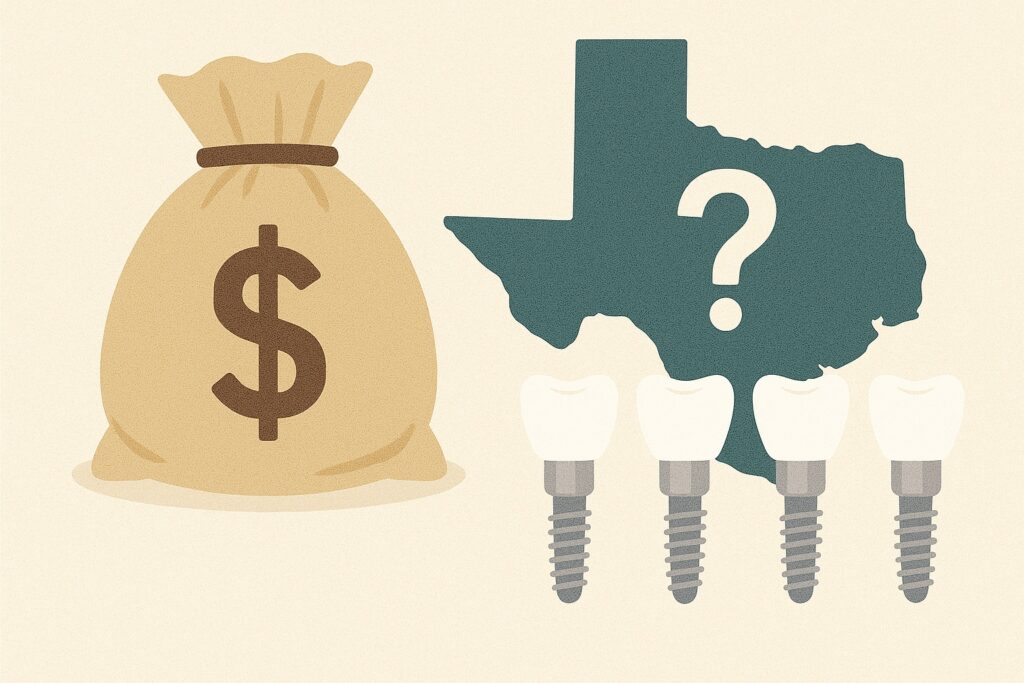Dental implants are a permanent solution for missing teeth, offering durability, function, and a natural look. But for many Texans considering treatment, one of the first questions is: how much will it cost? Implant procedures are rarely one-size-fits-all, and pricing can vary widely depending on the clinic, complexity, and location. Understanding the average cost of dental implants in Texas can help patients make informed decisions and prepare for what to expect financially.
Average Cost of Dental Implants in Texas
In Texas, the average cost of a single dental implant ranges from $3,000 to $6,000, depending on what’s included. This estimate typically accounts for:
- Implant placement surgery
- Abutment (connector)
- Crown (tooth restoration)
Some low-end quotes may only reflect the surgical placement of the implant, not the full procedure. On the higher end, the price may include advanced imaging, sedation, or specialist fees.
Here’s a general breakdown:
- Single implant (implant + abutment + crown): $3,000–$6,000
- Implant-supported bridge (3 teeth on 2 implants): $6,000–$10,000
- Full arch (All-on-4 or All-on-6): $15,000–$30,000 per arch
- Implant-retained dentures: $4,000–$8,000 (for 2–4 implants and a removable denture)
While prices in Texas are generally lower than the national average, they still vary depending on specific factors like surgeon experience, the number of implants, and whether additional procedures (e.g., bone grafting) are needed.
Cost Differences by City in Texas
Dental implant prices can vary significantly depending on the city or region. Factors like cost of living, demand, provider competition, and clinic reputation all influence local pricing. Here’s a general look at what you might expect across major Texas cities:
- Houston: $3,000–$5,500 per implant
- Dallas/Fort Worth: $3,500–$6,000 per implant
- Austin: $3,800–$6,200 per implant
- San Antonio: $3,000–$5,000 per implant
- El Paso: $2,800–$4,500 per implant
While these ranges are helpful for estimating, a proper consultation is necessary to get an exact quote tailored to your needs.
What’s Included in the Dental Implant Cost?
Many patients are surprised to learn that the advertised cost of a dental implant may not include the full procedure. A complete dental implant treatment typically involves multiple stages and components:
Included in Most Complete Estimates:
- Initial Consultation: Examination, dental history, and treatment plan
- X-rays or 3D Imaging (CBCT): To evaluate bone structure and plan placement
- Surgical Placement of the Implant: The titanium or zirconia post inserted into the jawbone
- Abutment Placement: Connector that links the implant to the crown
- Crown Fabrication and Placement: The artificial tooth, typically made from porcelain or zirconia
Additional Costs (if needed):
- Tooth Extraction: $100–$500 per tooth
- Bone Grafting or Sinus Lift: $500–$3,000 depending on complexity
- Sedation or Anesthesia: $200–$1,000 depending on method
- Follow-up Visits or Adjustments
Not all practices include these in their advertised price, so it’s important to ask for an itemized estimate before committing to treatment.
Factors That Affect Implant Pricing
The total cost of dental implants can vary significantly based on individual circumstances. Here are the most common factors that influence pricing in Texas:
1. Type of Implant Procedure
- A single implant is more affordable than a full-arch restoration.
- Procedures like All-on-4 or implant-supported bridges involve more planning, materials, and lab work, increasing costs.
2. Implant Materials
- Most implants are made of titanium, but zirconia implants (metal-free) can be more expensive.
- Crown material also matters—porcelain fused to metal is often cheaper than solid zirconia or ceramic.
3. Bone Grafting or Additional Procedures
- If you don’t have enough bone volume, bone grafting, sinus lifts, or ridge augmentation may be required.
- These procedures can add $500 to $3,000 to the overall cost.
4. Provider Experience and Credentials
- Specialists such as oral surgeons or periodontists may charge more than general dentists due to their advanced training.
- Practices using 3D planning software, digital impressions, and guided implant surgery may have higher upfront costs but better long-term outcomes.
5. Technology and Lab Fees
- Clinics that use in-house labs or advanced milling technology may bundle costs into one price.
- External lab work and custom prosthetics can increase expenses, depending on complexity.
Insurance Coverage and Financing Options in Texas
Most dental insurance plans do not cover the full cost of implants, but many will partially cover specific components of the procedure.
What Insurance May Cover:
- Tooth extractions
- X-rays or CT scans
- Crown placement
- Bone grafting (in some cases)
Implant surgery itself is often classified as an elective procedure, but some premium plans or PPOs offer partial reimbursement. Always check your policy or speak with your provider for clarity.
Financing and Payment Options:
Many dental practices in Texas offer in-house financing or work with third-party providers like:
- CareCredit
- LendingClub Patient Solutions
- Sunbit
- Proceed Finance
These plans often include 0% interest promotional periods or monthly installment options, making implants more affordable over time.
For patients without insurance, discount dental plans or cash payment discounts may be available. Some clinics also offer implant specials or bundled pricing packages, especially for full-mouth restorations.
Conclusion
Dental implants are a valuable long-term investment in your oral health, but costs can vary based on where you live, the complexity of your case, and the provider you choose. In Texas, the price of a single dental implant typically ranges from $3,000 to $6,000, with full arch options reaching $15,000 or more per arch.
Understanding what’s included in the cost—and what isn’t—is essential before starting treatment. Factors such as implant materials, necessary preparatory procedures, and insurance limitations all impact your final bill. Fortunately, many dental practices in Texas offer flexible financing options to help make treatment more affordable.
If you’re considering dental implants, schedule a consultation with a qualified provider to get a personalized treatment plan and accurate pricing based on your individual needs.

